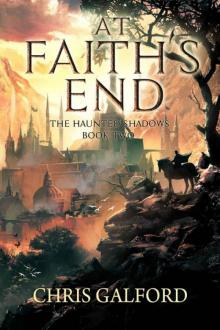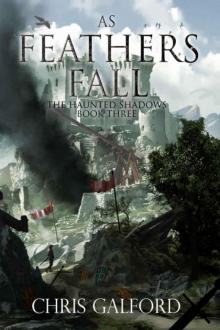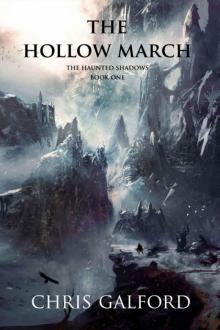- Home
- Chris Galford
As Feathers Fall Page 46
As Feathers Fall Read online
Page 46
“Lord Chancellor,” the doormen called to him. Then they pressed the gilded doors open to him, and opened the last hurdle to a nation.
To the south and east, his brother still rode roughshod over the provinces, desperately trying to keep their collection of states together. It was nothing easy won. Lands traded battle by battle, what was lost often turned hands again two, three times over the course of months. The Imperial army had been broken before his own city’s gates, but many still raised the banners of rebellion, and not all were easily caught in a field either.
Had he been able to split his own forces, it might have been easier. But he had to keep his friends close. Duke Urtz was great aid in the south, but Walthere made sure his brother never let him off his leash—he would not forget the example of Mauritz. Not with one so ambitious. Not with so much so lately won.
Troops had crossed from Ravonno, despite the Patriarch’s public endorsement of the new emperor. “We fight the devil beneath, not the boy above,” the fool wrote. Others crossed from Banur—his wife’s kinsmen, looking to take the fight to the orthodox Visaji. From both sides, some ended up fighting for Cullick’s troops, others against. The sides traded, broke down, only gradually yielded to his iron will. It became muddled, insensible. But he persevered. And for that, the country persevered.
In the north, his own loyalists were hard-fought against bandits and against rioting, rebellious aswari. Landlords had been burned out of their homes. An army of loyalists was still rampaging through the wetlands and the dunes, calling themselves “The Gryphon Lords.” Idiocy. The lot of it. But this was what happened when central authority broke down. Chaos was to be feared by any state.
But they were making headway, as the throne room attested.
Cullick pikemen, clad in red cloaks and gold-tinted armor, stood arrayed beside him on the throne room’s eastern wall. Facing them were members of the palace guard, their black arms and gold cloaks meant to intimidate, yet so many of them looked like puppies dressed up in cloth. It was enough to draw a smile on the elder Cullick’s face. His men could slaughter their counterparts here, no doubt—there was simply no longer a need.
There was a palpable chill to the room. Cullick could feel it bunch atop his shoulders like a second cloak, gathering itself against all the other nuisances afoot. This was the first time he had been before the throne since old Emperor Matthias had sloughed his seemingly ageless rear upon its countenance. Ageless. He was dead now, and still his specter seemed to flit about the room, passing judgment where it could.
Watch and despair, old bird. Your wings are finally clipped.
Instead, it was his daughter crouched upon the golden throne as a lioness set upon the kill. Her eyes met his across the room, following his trail—strong eyes. Earthen eyes. His own eyes, looking back at him. There were those that said only a boy-child would do. They were fools. Fools that had not learned: so long as one provided a firm hand to guide, any child could be led to the full scope of possibility.
His was no longer merely Charlotte. On that throne, with her husband squirming docilely beside her, she was a queen. Empress Charlotte. Empress Cullick. First of her name. First of a new era. He might have thought it a cruelty that she should put her child husband through affairs of state like this, but it was her choice now. Kinder, perhaps, to teach him young who rightly rules. Assal only knew if he would survive to adulthood.
Honestly, it was a matter of need.
He bowed, and bowed low, before all the attendants of the court, whose love was as fickle as their honor. “You honor me with your summons, noble Empress. How might a humble father do this court service?” It was a larger strain to push himself back upright in his words’ wake, but he managed it, as his daughter began peeling an orange herself in her deceptively delicate hands.
There were some twenty attendants to the court that day, as best as Walthere could see. It was telling that none of them found interest in the geometry or decoration of the room but were, almost to a man, focused on his person. The guardsmen were unperturbed, almost subtle in their mannerisms. He suspected poor news from the south.
If only that damnable witch was still with us. A word. A breath. That is all we should need.
“You have served the realm faithfully, Lord Cullick, as stalwart warden, as scion of your house, and as Chancellor now, a forward-thinking at a time when the realm has known so much pain and misfortune, from shortsighted men. You have leant us vision through all of this, and held the rest of us together where we lost our way. “Every one of us owes you a debt, ser, which can never be repaid.”
Despite his efforts to hide the fact, and the pride he felt swell at the acknowledgement, he felt a prickle of something less familiar. He found himself leaning heavy on his cane, docile as a cow. They looked, he mused, like ornaments in this court. Every one of them.
“But your brother and the noble Duke Urtz lead our armies in the field. We set upon this throne as our title has portended, and the houses of Cullick and Durvalle have come to peace at last, leaving the core of the realm at a peace for which we have long dreamed. Through war, there was no other who could have done the things which you have done.
“Yet now is a time of reconciliation, not counteraction. You have taught us that evolution is necessary to evade the rigors of stagnation. We see this, and so we turned our heads to the next generation…in all things. Which is to say: we thank you for your service, my lord Cullick. You will go with all the rewards of a conquering hero, of a man of triumph, to reflect upon what has gone before and to serve our court as best we now see it.”
He felt his years then. Every one. It was a dream. It had to be, and for that, he scarcely breathed. This had not been part of the plan.
“Your Majesty, there is yet much in need of reform within our nation, and without a steady hand to guide this most delicate of transitions…”
His daughter’s voice was soft as silk as she said, “We are the steady hands, which yours have raised. Our estimable sister, the lady Sara Durvalle will take your place as Chancellor.”
Someone gasped. A woman—that is to say, a woman who had not borne a crown—had but rarely sat the council in all its years. Now, for one to sit at the right hand of another? Unthinkable. Unfathomable. She does this to hurt me. What did that bitch whisper in her ear? He felt so very small then, but the cool reserve of years was not so easily broken. A man who raised a cub knew also how to curb it.
It was strange. A part of him—the father’s part—could still look on this woman and see naught but a child. Naked, weeping, grasping for his finger as the nurse changed her smallclothes. His child. Yet it could not be denied that this woman was now a queen. She had swelled into the full summer of her youth, envy of men and women across the realms, blond as a lion’s mane, with gold and silk and emeralds to make her second only to gods before all other creatures of the flesh.
When she had flowered, there was none so full of life and mischief as she. None so fair, nor so sweet. He had tempered that. Repurposed that into the lioness before him today.
Yet still, the child. The mischievous child.
He looked up sharply. “I will not—”
“You will depart, ser, with thanks for your service. You will return to Fürlangen from whence you came, with all the honors of this court, and await our word for your next commission. Your Emperor, and your Empress, command it.”
In one of the rare moments of his life, his daughter cut him off. Utterly. And she kept her face as stone as she did it. As he had taught her.
Nature moved fathers to desire better for their children than life had given them. But at some point, one had to wonder: how much was too much? When did the whole thing fold in on itself? Without fear or enemy to focus upon, the ill inside a person tended to turn upon themselves, a destructive force—and it was this force that he saw shining in his daughter’s eyes, aloof, so far beyond him as to be divine.
It was funny, he thought, how one could so desperately strive fo
r something and yet be so blind to what it actually meant to achieve. Family. Yes, he had done all he might for his family now, and in so doing, moved it irreparably beyond him.
She looked beyond him, and he was dismissed.
The halls of the palace were more spacious than those of Vissering. More room, he supposed, for the whisperers and flatterers, heathens and fornicators to primp and preen and flutter about in anticipation of their next mark. Yet tonight there were no torches lit beyond the royal chambers, leaving the rest to dim shadows.
He stumbled once, cursed his way over to a moonlit window. Dew clung in little drops along the windowsill, the result of a night fluttering between the heat of summer days and the chill of autumnal nights. It left a heaviness to the air that caught in his chest.
He stood there for a time, looking out on the misted city below. For so many years, so many decades, this cobbled collection of stone, mud and shit had been his life’s ambition. Now that he had recaptured it in his family’s name, it seemed…empty. Only a few scattered flickers of torchlight still illuminated the streets. It was too late for decent folk.
“I misjudged you,” he whispered into the damp air. Then he turned, to find one of the shadows had moved.
He staggered back, but something slammed him between the ribs and lifted him off his feet. It stole his breath with a lurching wheeze and bludgeoned him against the stone wall. In the moonlight, he looked down to find cold steel warming itself in his skin, nearly to the hilt. Blood marred its hoary luminescence.
What, I…Ustrit…Hacket…But his guards were not there. They had died, moons before, and all this new blood he gathered now about him…it would not have done to bring them to the throne room, in what was supposed to have been a moment of glory. They were far away, sleeping the victors’ sleep.
An unforgettable face drew up before him, untouchable even by the light of the moons. Skin like pitch stretched skeletal across lean, muscled limbs that had coiled about the end of a sloped blade. Ebon-dyed cloth buffeted him against the stone.
“Aurinth?”
The iruwen removed a hand from his sword to press it against Walthere’s mouth.
“Bear ye now that web we weave,
tangled at the seams, our manly art,
when all be words, to soft deceive
the gentle madness of our part.”
Who…? For a moment he did not understand. With their irritating rhymes, the words were more riddle than explanation. Then it all became clear. Absent torches. Cool dejection. It had all been a statement, a moment woven into being. A crown lay at the center of the web.
“Charlotte,” he rasped. A new sort of pain washed over him.
The assassin pulled his hand back, just so. “It is being said, that love should never die, but one cannot choose family. Choices on choices, lion, made under coat of war, are scarce forgotten even in the summer’s shedding. Your daughter will be weeping for you, as she has for all your wills which led her to this end.”
He tried to rise; the assassin did not even move, but he had not the strength. He could not feel his legs, could scarcely feel his arms, and every gust of wind seemed an abominable chill. Not summer any more, but eternal winter. Somewhere he could hear the ghosts of its winds howling for him.
Walthere tried to cry out, but every labor of sound was a fresh stab in his veins, and the hand pressed tight over him once again and stole the fruits of that agony away. What’s more, he knew there were no guards to hear him. No wife. No children. All were gone, hidden away atop the altars he had raised for them, against the sake of all others. Everything, everything he had done for them.
“It is only being a short suffering,” Aurinth said with a monastic dip of his bald head. “The rest will be a whisper.”
For a moment in time, in the silver malevolence of that gaze, he remembered another set upon death’s door. Even within the pool of darkness, he could clearly see those eyes staring back at him, awaiting the fall of the blade that would forever sever their two families. It all came down to children, in the end. What they did. What others would do for them.
Just a whisper. Nothing more.
With a twist of his claws, he began to move the blade.
About the Author
Chris Galford spends his days as a freelance journalist and editor. Writing, in all its forms, has been his passion from a young age, but fantasy and science fiction are the sparks that give his nights purpose. A native of Michigan, in his spare time he can usually be found wandering the lake shore with a camera in one hand and a pen in the other.
The Hollow March, the predecessor to At Faith’s End and As Feathers Fall, was his first major work, based on a series of short stories he wrote in the summer of 2008, titled The Company of the Eagles. Another short story set in the same world, “The Child's Cry,” was published in the Twelfth issue of Mystic Signals magazine.
Visit his website at: http://cianphelan.wordpress.com/
Or contact him directly at: [email protected]

 At Faith's End
At Faith's End As Feathers Fall
As Feathers Fall The Hollow March
The Hollow March